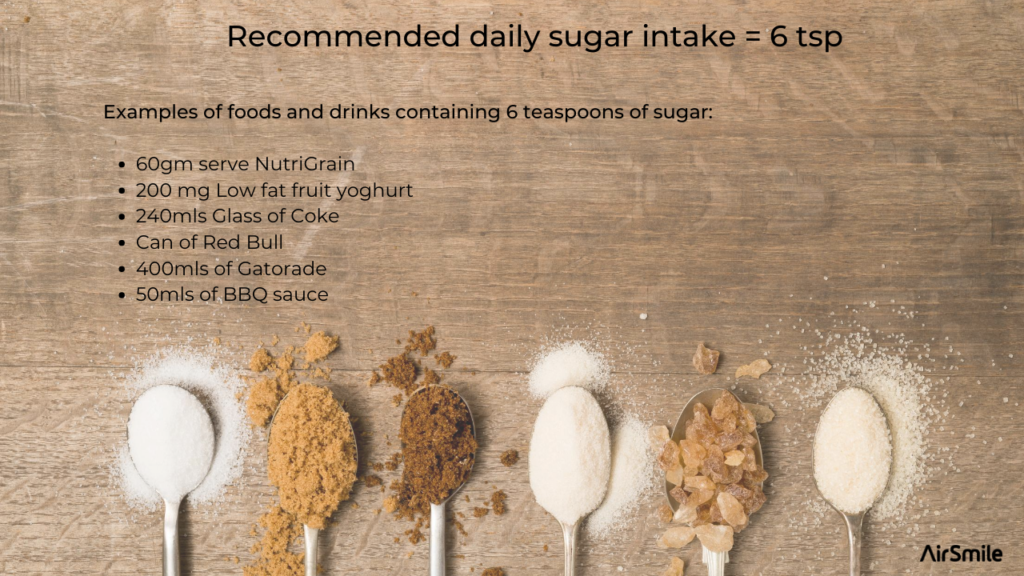August 3rd marked the beginning of Dental Health Week in Australia and this year’s message is clear! We’re NOT a ‘sugar savvy’ nation. The latest data shows 73% of young people age 14-18 years, and 47% of adults, consume too much sugar.
But is sugar really to blame for our population’s chronic poor health? Let’s find out the effects of sugar on health.
When you read headlines like “Experts Agree: Sugar Might be as Addictive as Cocaine“, it can really get you thinking about the relationship we have with sugar, and the reported stronghold it has on a large proportion of the world. The World Health Organisation (WHO) recommends we consume no more than 24 grams, just 6 teaspoons, of free sugars per day. More accurately, no more than 10% of your total daily energy intake (see how to calculate your total energy intake here). Free sugars include sugars added to foods and drinks during preparation and manufacturing, and also those found naturally in honey, syrups, and fruit juice. When you consider what you put in your mouth or your children’s mouths, you can see how quickly your daily dose adds up.

Articles and research documenting the damaging effects free sugars have on the mind and body is enough to turn you off from eating altogether. Sadly these findings are well-founded, and if we want to see type 2 diabetes number fall, emergency trips to the hospital for obesity-related conditions reduced, and preventable diseases a thing of the past, we need to take action now.
Let’s look at some statistics;
- The cost of obesity on the nation is projected to be in excess of $87.5 billion over the next ten years if no action is taken (2015)
- Each day 280 Australians are diagnosed with diabetes. That’s one person every 5 minutes (2016)
- Excessive dietary glucose and fructose have been shown to increase the production and accumulation of fatty cells in the liver and bloodstream which is linked to both cardiovascular disease and kidney and liver disease (2015)
- 1 in 2 people aged 18 and over (49%) did not eat the recommended 2 serves of fruit per day, while over 9 in 10 (92%) did not eat the recommended 5–6 serves of vegetables (ABS 2018).
- Australian research suggests that weight issues and obesity in childhood is associated with depression, poorer health-related quality of life, and low self-esteem (Sanders et al. 2015).
With all that said, is sugar itself really the main cause for all this disease and ill health?
Contradicting articles and academics suggest the link goes beyond just ‘consume too much sugar and you’ll get sick. Rather it looks at a bigger picture as to the real reason sugar is labeled as the devil’s food. Before I continue I must stress, every source agrees that excessive intake of free sugars, particularly in the form of sugary beverages, increases health risks. No one on earth is disputing that. However, I found it interesting to take a deeper dive into the research as to how a high sugar diet causes these chronic poor health conditions. I feel we need a new message to educate the people. ‘Eat less sugar because you’ll get fat and sick’ clearly isn’t getting through. Perhaps it’s time for a new spin on marketing the way to a healthier body.
Could knowing how sugar impacts us be the key to helping people prevent poor health in the first place?
Rachel Johnson, professor of nutrition at the University of Vermont in Burlington explains my point best: “The bottom line is that sugar does one of two things. It either displaces more nutritious foods in your diet, which means you’re screening out nutritious-dense foods, or it adds calories to your diet. So if you’re adding calories on top of an already nutritious diet, that puts you at risk for weight gain.”
I’ll continue by adding, if you’re filling up on sugary products, leaving no room for the good stuff needed to thrive and be well, that’s when your body becomes sickly, stressed, and chronically ill. Being overweight is just one possible side-effect of high sugar diets. Don’t be fooled you’re safe from diabetes and heart conditions if you’re of normal weight yet eat junk all day.
This step back looking at the ‘how sugar impacts us’ makes total sense, in my opinion. How often have you opted to eat an entire bag of chips, a muesli bar, or a bottle of soft drink or juice over a bowl of veggies with avocado dip, a banana, or a glass of water! Yep… me too! Therefore, could it be that sugar itself isn’t to blame for obesity, heart disease, diabetes, and stressed livers and kidneys, but instead – the bigger picture, is it what we’re not eating because we’re filling up on sugary treats? It’s certainly food for thought.
There is one undisputed fact on the damage sugar can and will have on your body if you’re not careful.
Tooth decay. It’s the most common chronic disorder in Australia with more than 90% of Australian adults have experienced decay in their permanent teeth (2018). Dental diseases are the most prevalent non-communicable disease globally and, although we’ve seen vast improvements in the prevention and treatment of dental diseases over the years, problems still plague our population. Over 2 million Australians avoid seeing a dentist every year. This leads to people suffering from preventable pain, long-term dental anxiety, and social and professional setbacks because of unsightly smiles, among other issues. Even more alarming, 1 in 10 preventable admissions are due to dental conditions, mostly untreated tooth decay. Read more.
Certain bacteria in the mouth love sugar as much as we do. They feed on sticky sugary treats and turn sugar into acid. If left on the surface of your teeth for too long, this acid eats into your tooth. Without treatment, this acid attack can reach the nerve of the tooth. This often results in severe pain and an expensive dental emergency trip to the soonest available dentist, or hospital as stated earlier.

Time for some good news. The treatment is easy! As easy as choosing to eat a carrot instead of that delicious doughnut – perhaps not. However, both are in your control. Bacteria can only feed on sugar that’s left on the tooth surface for too long. Good saliva flow, regular sips of water, chewing sugar-free gum after eating and brushing twice a day (flossing one of those times), and of course visiting your dentist when you’re told to – in most cases, is all you have to do to prevent tooth decay. Similarly, to avoid chronic illnesses relating to choosing to indulge in sweet treats verse healthy ones is in your control.
Now you know ‘how to get control of your oral and general health. If you need help in identifying ways to decrease your dental decay that will lead to bettering your overall wellness, jump on AirSmile now and find a dentist to help you get back your beautiful healthy smile.
Want to get control of your health?
Find a dentist to help you get there on AirSmile
Free to Join







